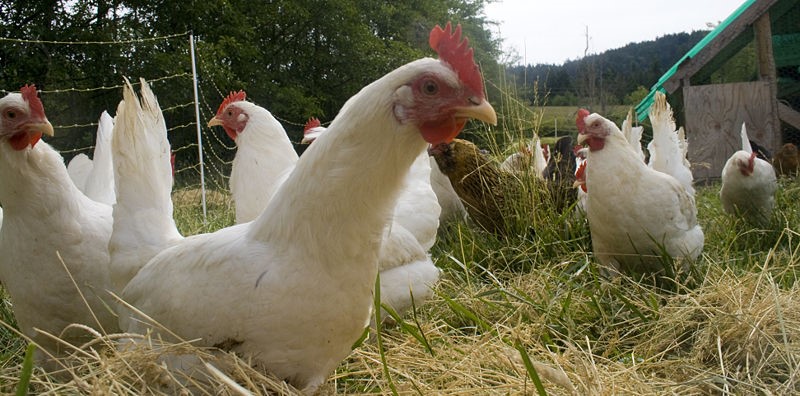RVC academic leads study examining bacteria in chickens which leave thousands of people unwell every year
A new study published in the Scientific Reports journal, led by Royal Veterinary College (RVC) lecturer and Roslin scientific associate Dr Androniki Psifidi, has revealed how genes influence chickens’ resistance to Campylobacter, a genus of bacteria that causes food poisoning in thousands of people ever year. Significantly, the study identified that control strategies for the bacteria should take non-genetic factors into account when being designed.

Campylobacter is the leading bacterial cause of food-borne gastroenteritis worldwide. Symptoms of infection include diarrhoea, fever, vomiting and stomach cramps. In the UK alone, it is estimated that more than 500,000 people are infected each year, costing the country approximately £50 million.
The study, undertaken by researchers from the RVC and the Roslin Institute, in collaboration with the poultry breeding company Aviagen, investigated the genetic make-up of 3,000 chickens bred for meat. The aim of the study was to identify if elements of the chickens’ genetic code were linked to resistance to colonisation by Campylobacter bacteria.
The researchers explored variation at specific positions in the chickens’ genome and their association with numbers of Campylobacter in the gut of the birds. The study also analysed the expression of genes in chickens that were resistant or susceptible to colonisation by the bacteria.
The study concluded that, although there are genetic factors that influence Campylobacter colonisation, these factors play a minor role, meaning it is crucial to characterise and understand the role of the non-genetic and environmental factors to further reduce Campylobacter levels in poultry.
All the chickens were naturally exposed to Campylobacter present in their environment, which mimics how chickens are exposed on a commercial farm.
Dr Androniki Psifidi, Lecturer in Veterinary Clinical Genetics at the RVC, said
“Although we identified a genetic component to resistance of chickens to Campylobacter, this was relatively small, and the majority of the chickens we studied already carried regions of the genome associated with resistance to gut colonisation. According to our results, other non-genetic factors play a greater role and will need to be considered in the design of control strategies.”
Notes to Editors
This full paper is freely available open access at: https://www.nature.com/articles/s41598-020-79005-7
Photograph credit: Free range chickens, Woodleywonderworks
Photograph license: https://creativecommons.org/licenses/by/2.0/deed.en
For more information please contact:
- Jasmin De Vivo (Jasmin.DeVivo@plmr.co.uk)
- Press Line: 0800 368 9520
Reports:
AMR Funders Forum Research Capacity and Skills Review (2018) https://mrc.ukri.org/documents/pdf/amr-research-capacity-and-skills-review-2018/
UKCDR - Antimicrobial Resistance in International Development: UK Research Funding Landscape (2019) https://www.ukcdr.org.uk/resource/antimicrobial-resistance-in-international-development/
About the Bloomsbury SET:
Starting in April 2018, this £5-million translational research programme led by The Royal Veterinary College (RVC) and funded by Research England’s Connecting Capability Fund, has focused on the development of new vaccines and diagnostic tools, and addressing innovative approaches for data analysis and public health. For more information, please see: https://bloomsburyset.org.uk/
About the RVC
- The Royal Veterinary College (RVC) is the UK's largest and longest established independent veterinary school and is a Member Institution of the University of London. It was the first in the world to hold full accreditation from AVMA, EAEVE, RCVS and AVBC.
- The RVC is the top veterinary school in the UK and Europe, and ranked as the world’s second highest veterinary school in the QS World University Rankings by subject, 2020.
- The RVC offers undergraduate and postgraduate programmes in veterinary medicine, veterinary nursing and biological sciences.
- In 2017, the RVC received a Gold award from the Teaching Excellence Framework (TEF) – the highest rating a university can receive.
- A research led institution with 79% of its research rated as internationally excellent or world class in the Research Excellence Framework 2014.
- The RVC provides animal owners and the veterinary profession with access to expert veterinary care and advice through its teaching hospitals and first opinion practices in London and Hertfordshire.
You may also be interested in:
-
New research from the RVC highlights pandemic risks posed by evolving swine flu viruses in Europe
A new study led by the Royal Veterinary College (RVC) has revealed significant genetic and …

